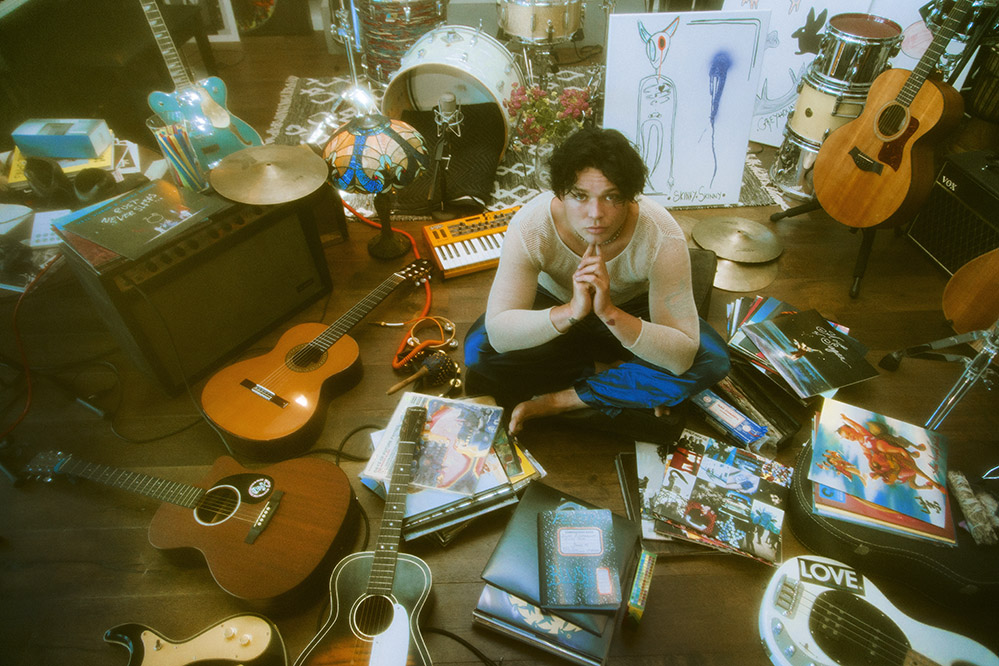Ashton Irwin underwent a sonic, lyrical and emotional flourishing to create his debut solo record Superbloom. After spending the better part of the last decade as the drummer for 5 Seconds of Summer, quarantine gave the 26-year-old Aussie the push he needed to undergo a creative metamorphosis beyond the comfort of his band brothers.
Bunkered down in their LA home, Irwin and his producer slash musical mentor slash housemate Matt Pauling spent four months pouring everything they had into the record. Irwin parked his pop punk roots and instead drew inspiration from icons he has become so well acquainted with in his headphones over the years. He wrote ‘Skinny Skinny’ while submerged in a deep Nick Drake listening binge, drew inspiration from goth-pop legends The Cure and My Bloody Valentine on ‘Scar’ and created his own fusion of Soundgarden and Tears For Fears on ‘Greyhound’.
Despite this long list of influences from the ’90s and beyond, Superbloom is an undeniably original and personal body of work. This can largely be attributed to the incredibly earnest songwriting on the record. Irwin recounts his crippling experiences with body dysmorphia on ‘Skinny Skinny’, struggles with addiction and sobriety on the acoustic ‘Matter of Time’ and the need to break free from the pop music machine on ‘Perfect Lie’. He still considers himself a huge 5SOS fan, but Superbloom is the type of album that he could’ve only forged on his own.
Irwin has nurtured the growth of his voice not only lyrically but literally as well. He’s no stranger to the microphone, but his new position as a solo frontman has given him the chance to flex his vocal cords. A natural rock vocalist, his voice shapeshifts from clean, dry whispers to guttural screams and anthemic calls over the 10 tracks.
Superbloom is by no means a farewell to 5SOS. In fact, his bandmates were some of the first to hear the record. However, it has given Irwin the room to build something of his own from scratch and the permission to push his creative limits without any expectations of attaining perfection. It’s honest, oftentimes heartbreaking and unquestionably him.
Over Zoom, Music Feeds caught up with Irwin to talk about his creative transformation, making music without inhibition and how Superbloom has helped him carve a new musical mission statement.
Music Feeds: Hey Ashton! How are you? Are you in LA right now?
Ashton Irwin: I’m good. Yeah, I’m in my studio. I live in Studio City, with all the other studios and drummers (laughs).
MF: How has everything been over there? I can imagine it has been especially tough with your family back in Australia.
AI: Yeah, I haven’t seen my family since I came back home to Australia to play the bushfire relief concert at ANZ Stadium. That’s when I was home last and then I came back to the US. So I’ve been here ever since. Living here at this point in time as an artist is incredibly confusing and confronting because society has been uprooted for the better in my opinion. And a lot of changes are happening in this country. So you know, sometimes I think, “Man, I would really like to be back in Australia”. There it’s not as chaotic. But this is the epicentre of political change, cultural change.
All these things are happening at the moment where I am and that’s what made me think I am in the right place. Creatives and artists are really most powerful in the environments that are most conducive for humankind to change. And at the moment in the US, there’s an incredible dark side and an incredible duality of light side. So I don’t mean to make it sound like an episode of Star Wars but both things are happening at an incredible velocity at the moment. So I’m glad to be here as an artist.
MF: You’ve had a very productive 2020 given the state of the world right now. It seems like you just dropped CALM with 5SOS in March and now Superbloom is here. Did you create the entire record in quarantine?
AI: Yeah! So, 5 Seconds of Summer predominantly exists in a pop framework. So in terms of lyricism, in terms of recording, in terms of motivation on CALM, the 5 Seconds of Summer record, we had finished that record roughly a year and a half before it was released. So I actually haven’t made a record for nearly two years. So Superbloom came quick.
I started in February, but I was due to be creating again, writing new lyrics and having a new perspective on who I was. It just so happened that the world kind of uprooted and changed because of the pandemic and the immense suffering that was happening. We found ourselves indoors and we found ourselves with nothing to do. And I was like, “Well, that’s not me”. I’m a songwriter. I’m an artist. I could create something on my own and see if I could really push myself to write full songs, to creatively direct and create a whole project, a whole record. So I just went down that wormhole with my housemate, Matt Pauling, who co-produced the record with me. And it was intense. And it was incredible. To get to this place now where I’m speaking about it to someone else, because I made it in this very room, it feels amazing.
MF: So it all started with the track ‘Have U Found What Ur Looking For?’. How did that come about and shape the rest of the record?
AI: Yeah, so my musical tastes changed a lot. If you picture me as a music listener, I’ve sat on every mode of transport, every green room, every fucking hotel lobby, everywhere for the past 10 years with my headphones on just listening. I’m a student of music. I’m curious about it. I’m curious about the songwriting and I’m a fan of it. So ‘Have U Found What Ur Looking For?’ is a combination of all the bands I’ve recently loved. Whether it be artists like Tweaker or Nine Inch Nails. I listen to a lot of Curve. I listen to My Bloody Valentine and listened to a lot of ’90s stuff.
Then I started to be like, “Well, how do I record my vocals?”. I love all this stuff. These groups and these artists and these songwriters like Elliott Smith and stuff. And I’m curious, I’m like, “Well, maybe I could do that. Maybe that’s like my thing”. And it turns out, it really is my thing. Every instrument on the record, especially in ‘Have U Found What Ur Looking For?’ is played by Matt and I. We recorded the drums in the basement and it was just real DIY, honestly (laughs). But ‘Have U Found’ was the first one we did and it really kick-started us because we loved the sound of it. And we were fans of it. And we could picture it being played live. We could picture people really reacting to that song. That was a critical part of the development of Superbloom.
MF: That sounds incredible. Did the rest of the record just pour out after that?
AI: Yeah, it did! It was an intense, creative period. I can’t remember a lot of it. Matt and I speak about it because we got into this state where Superbloom made us alive. We just went in every day for maybe four months and just crushed it. We loved it. We loved creating it. We love getting the gear to make it. We loved using what we have in the house together and we kind of utilised every part of ourselves and expanding our personal abilities in terms of production and songwriting to create my first solo record.
MF: I can imagine creating records with 5SOS is such a well-oiled machine after all these years, whereas this seems like it was much more organic. Was that the case?
AI: Yeah, the machine is sometimes well-oiled in 5 Seconds of Summer (laughs). But it’s also not. There’s the expectation that it has organic elements. There’s the expectation that it is a live rock band. There’s the expectation that the producer who we will work with will record the band in such a way that it will be reciprocated in a fantastic way live. Basic band shit. But it is a pop group. And it is a top 40 band. And by chance, which is crazy, because we just started out as pretty much an All Time Low cover band (laughs). So we came a long way.
But yeah, in terms of organic process, this was heavenly. Honestly, it was awesome. It was just real for me. And it isn’t perfect. But it didn’t have to be. It’s a marvellous realisation for me and marvellous contentment within my artistry that I can expand on my own. And I don’t always have to be in a collaborative experience.
MF: We’ve heard you sing with 5SOS, but you’ve really broadened your range vocally on this record. What was that like to experiment with?
AI: Yeah, I think personally, Luke Hemmings is one of the best singers in pop since fucking forever. So are Calum (Hood) and Mike (Clifford), they’re fantastic singers as well. But in terms of having an identifiable, unique tone of voice and an incredible ability to sing, Luke Hemmings is literally, although I’m in a band with him, he’s one of my favourite singers (laughs). I’m blessed to be in a group with a guy like that. I met him when I was 16. And he wanted to be in a rock band, but he had a fucking soul voice that was such a wonderful voice. So I never wanted to be singing over the top of him in the band, because I think he’s just so good. And personally, as a fan of 5 Seconds of Summer, I like to hear him sing a lot. But in terms of my vocal, I always understood that my vocal was different. I have a rock voice, I have a tone and a vibrato that isn’t necessarily suited to modern pop. Being self-aware of my voice led me to a place “Okay, how do I record my vocal in a wonderful, unique way?”.
I got into vocal doubling. I got into a lot of live takes. I wasn’t chopping the vocal and tuning it with Melodyne. We were doing full takes of these songs. Matt Pauling said to me, “You’ve got to go learn these songs and sing them before we record them”, which is something you don’t really do in a pop band because there’s not really enough time. We’re pretty busy. So for me, it was like, “Well, I’m going to kick this vocal’s ass”. I was doing multiple vocal training sessions a week. I was really committing to expanding my vocal range. I was really committing to having a unique and fucking solid rock vocal. That’s really important to me.
MF: Well, I think it’s safe to say that your hard work paid off.
AI: Oh, thank you! Yeah, we’re getting there, I have a long way to go. But I love singing. I adore it so much. So it’s a marvellous expression of the soul. And yeah, it’s cool. So I’m gonna keep working on it, but thank you.
MF: I want to dive into some of the tracks a little deeper, so let’s start with ‘Skinny Skinny’ as it’s the first song you released off the album. It’s an extremely impactful song about body dysmorphia that has already garnered a pretty massive reaction. How did it come about and what does it mean to you?
AI: Yeah. It’s been an interesting reaction to that. I didn’t really realise how impactful it would be until I really started to dive into the imagery. It’s weird that the song came directly from the memory of having a conversation with my younger brother just being scared of being overweight, how we looked in his mirror, and I go “Fuck.” Like, a real moment of self-realisation and it unlocked something in me and I was [like], “I’ve felt like that since I was your age, man”.
It makes me quite emotional because I don’t know how many young men and women and everyone that this affects, but I know it’s a real thing. And it’s not always describable. So I did my best as a lyricist, to visually just talk about the anatomy of not wanting to eat, not wanting to look at yourself in the mirror, not wanting to weigh yourself, being scared of your own physical vessel as a human being. For me, it’s a really sharp, direct song that captures how I’ve felt with body dysmorphia.
MF: Yeah, it’s intensely personal but the way you describe is a very universal experience that we don’t articulate enough, especially through a male lens. But songs like this help open up that conversation.
AI: Yeah, I think particularly growing up as an Aussie and growing up, I didn’t have a father. So a lot of my self physical identity is built from a feminine perspective because I grew up with my mum. I think there is a really different type of masculinity that is in society and Australia, that really crippled my physical identity and sense of self. And I don’t have an answer to fix it or change it, but I think pieces of art like I made will be impactful. And exactly, as you said, open up a conversation about it in a real way. And allow people to feel a little safer to talk about it. Allow people to just talk about it in general.
MF: That anatomical lyricism in ‘Skinny Skinny’ and the candid songwriting on Superbloom in general really reveals a side of you that we haven’t seen before. What was the process to reach that point lyrically?
AI: That kind of lyricism is based on a lot of great ’90s bands. You know, I listen to a lot of like Stone Temple Pilots. And I listen to obviously, like I said before, a lot of Silverchair and I listened to a lot of people that kind of explored a performance persona that touched on being very androgynous. But in order to get to that place, you had to break down the expectations of what the human body would look like, and forget about it as a male. So it just goes hand in hand with me accepting myself as a performer and accepting myself as just being me in front of people.
MF: You’ve said that ‘Scar’ is your favourite track on the album. I’m very curious because I can imagine it would be difficult to pick one favourite. Why is that?
AI: I do love ‘Scar’. It really made me feel confident in the project. It made me understand my lyricism more. It felt energetic, to the extent that it would be an incredible live song. It was about my family, and if I want to release anything, it’s about them. Like if I could have a single that comes out that clearly states, “This is for my family”. That’s the most real I could be. Honestly, I have your straight to the core of who I am and what I care about with the song ‘Scar’.
Sonically, it identifies what I’m going for. It really does it. It’s the vocal recording that we were talking about before. I think it’s dynamic and powerful and unique. I think the guitar is heavy but there’s a sweetness to it that resembles a shoegaze era of the ’90s. It has massive vocal harmony, choir parts, which you start to hear all my influence from classic rock like Foreigner or Queen or these bands that did incredible vocal arrangements. That’s my strong point. Working on that stuff was cool. And that makes me say, yes, ‘Scar’, I think is my favourite.
MF: You’ve spoken a lot about the importance of a musician’s mission statement in the lead up to the release of Superbloom. What is yours? And has it changed from this experience?
AI: Yeah, we’ve identified a lot of my mission statement is self-acceptance and healing, unveiling trauma and looking into it, being brave enough to like… well, I feel angry at the world all the fucking time. I’m depressed. I resort to alcoholism, drugs, I do whatever the fuck I can to blackout. It’s like I’ve been there. I’ve been in that place. And I just, I support people healing themselves, repairing seeing themselves, wanting to be more empathetic or just developing empathy at all.
A mission statement of mine is to help guide young, creative, sensitive men as well, which is pretty weird. I just care. I care about how men are seen in society and I care about their development. Which I haven’t really heard anyone say. It’s just obvious. We’ve got to work on it. You can’t just say men are trash and forget about men. There needs to be character development, reinforcement, positive reinforcement. It needs to be loving. Men are not going to get better if we just hate them. Trust me. I’ve got my fair share of men I hate (laughs).
Then also, truthful art. I don’t want to be a part of a machine forever that releases perfect pop. Nothing is perfect about this, what I’m doing. Nothing. There’s nothing perfect about it. It’s just me as a human. I always say the mission statement thing to be a mentor to younger artists. You need a mission statement. You need to know why. And you need to be able to look people in the eyes and go, “Well, this is why I do music. This is why I’m an artist. This is why I care”. That could be about anything, but you got to have one. Otherwise, you’re just releasing shit that means nothing.
MF: Yeah, I think that helps people relate to your music but it can also keep you accountable. It’s like your North Star, right?
AI: Yeah, I think so. And it helps you not get caught up in things that don’t matter. Because you get to say to yourself, “Is this aligned with what I set out to achieve with my lyrics or my music or my even just the way I communicate?”
–












